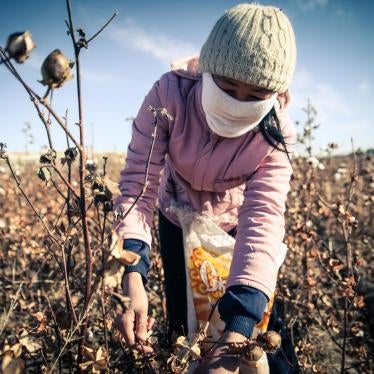The U.S. State Department’s decision to cut aid to the Uzbek government over its lack of progress on human rights is a welcome show of principled leadership, Human Rights Watch said today. In response, the Uzbek government should bring its human rights performance into conformity with its international commitments.
“This decision has been long in coming,” said Rachel Denber, acting executive director of Human Rights Watch’s Europe and Central Asia division. “It shows that the United States takes human rights records seriously and means what it says. Now the United States needs to continue its engagement with the Uzbek government and press for human rights improvements.”
The State Department’s decision, which was announced last night, was taken based on legislation enacted in 2002 that makes U.S. assistance to the Uzbek government conditional on that government’s efforts to improve its human rights record and institute political and institutional reform. For aid funds to be made available, the Secretary of State has to certify that the Uzbek government is making “substantial and continuing progress” in meeting its commitments made to the United States under a joint Declaration on the Strategic Partnership and Cooperation Framework, signed during Uzbek President Islam Karimov’s visit to Washington in March 2002.
In this declaration, the Uzbek government pledged to build a strong and open civil society, ensure respect for human rights and freedoms, and establish a genuine multiparty system. It also promised that it would ensure free and fair elections, permit political pluralism, diversity of opinions and the freedom to express them, and guarantee the independence of the media and the courts.
Despite these pledges, the Uzbek government’s human rights record has remained poor. It continues to harass human rights defenders and has not registered a single independent domestic human rights group since the last certification decision in May 2003. In fact, authorities have taken a significant step backwards by imposing burdensome new registration requirements on international nongovernmental organizations (NGOs), and closed the Open Society Institute’s office in the Uzbek capital Tashkent.
Credible reports of torture and ill-treatment in custody continue to arrive at Human Rights Watch’s Tashkent office. Not only has there been no movement toward media freedom, but there has been backsliding on freedom of expression and assembly.
With less than six months before Uzbekistan’s parliamentary elections, the government has taken no steps to promote electoral freedoms. Not a single genuine opposition political party has been allowed to register ahead of the December election, and their members face harassment and criminal prosecution. New legislation bans NGOs from working with political parties, preventing them from doing work to promote free and fair elections. An amendment to the law on NGOs prohibits all foreign and international NGOs and their staff from participating in any political activity, including the creation of new parties and movements. An amendment to the law on political parties prohibits foreign governments and NGOs from working with registered political parties.
The U.S. decertification decision follows on the heels of a prior decertification decision by the Bush administration, taken in late 2003 under the Cooperative Threat Reduction program, which helps former Soviet republics destroy and avoid proliferation of nuclear, chemical and biological weapons. That decision, however, came with a national interest waiver permitting funding to continue, but such a waiver does not exist for the assistance subject to yesterday’s decision.
The decision is also consistent with the U.S. stance on an unprecedented decision in April by the European Bank for Reconstruction and Development. After completing its one-year assessment of the Uzbek government’s steps toward meeting human rights benchmarks, the EBRD announced that it would limit its investment in Uzbekistan over the government’s lack of progress. The decision was taken unanimously by the bank’s board of directors, and had the full support of the U.S. government, which is a key shareholder.
Human Rights Watch emphasized that human rights conditionality on foreign assistance to Uzbekistan should include continued engagement with the Uzbek government on human rights, cautioning against the commonly made assumption that a decertification decision would signal a declaration of failure and the United States walking away from Uzbekistan.
“These decisions are part of an ongoing, long-term process of engagement between the United States and Uzbekistan,” said Denber. “The administration should continue to push for specific reform steps in Uzbekistan and hold out as a carrot the prospect of recertification.”
Human Rights Watch identified several reform steps the U.S. and other governments should continue to press for, including improving the climate for NGOs, allowing opportunities for peaceful dissent, and the implementation of recommendations on eliminating torture, made by the U.N. Special Rapporteur on Torture following his visit to Uzbekistan in late 2002.
Human Rights Watch also stressed the need for the international community to pursue a consistent human rights message with the Uzbek government.
“Only when the international community sends a coherent message to the Uzbek leadership about the need for tangible progress on human rights do we see a real potential to trigger reforms,” said Denber.
In particular, Human Rights Watch challenged the European Union to become more vocal on human rights in Uzbekistan, noting that even though the European Union is a majority shareholder of the EBRD, there have to date been no known consequences of the EBRD’s April decision on EU-Uzbek relations. The European Union has also proven reluctant to push for concrete progress in human rights by leveraging its Partnership and Cooperation Agreement with Uzbekistan, the framework regulating its relationship with the country. Its voice overall in the face of Uzbek government abuses has been disappointingly weak.






